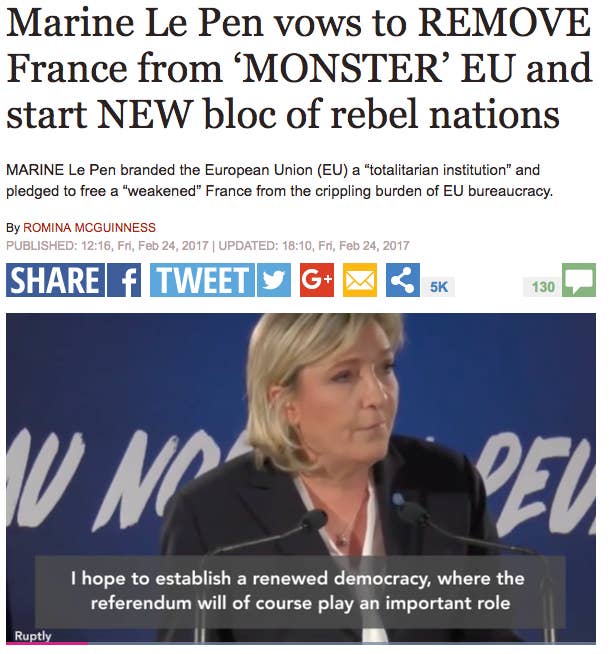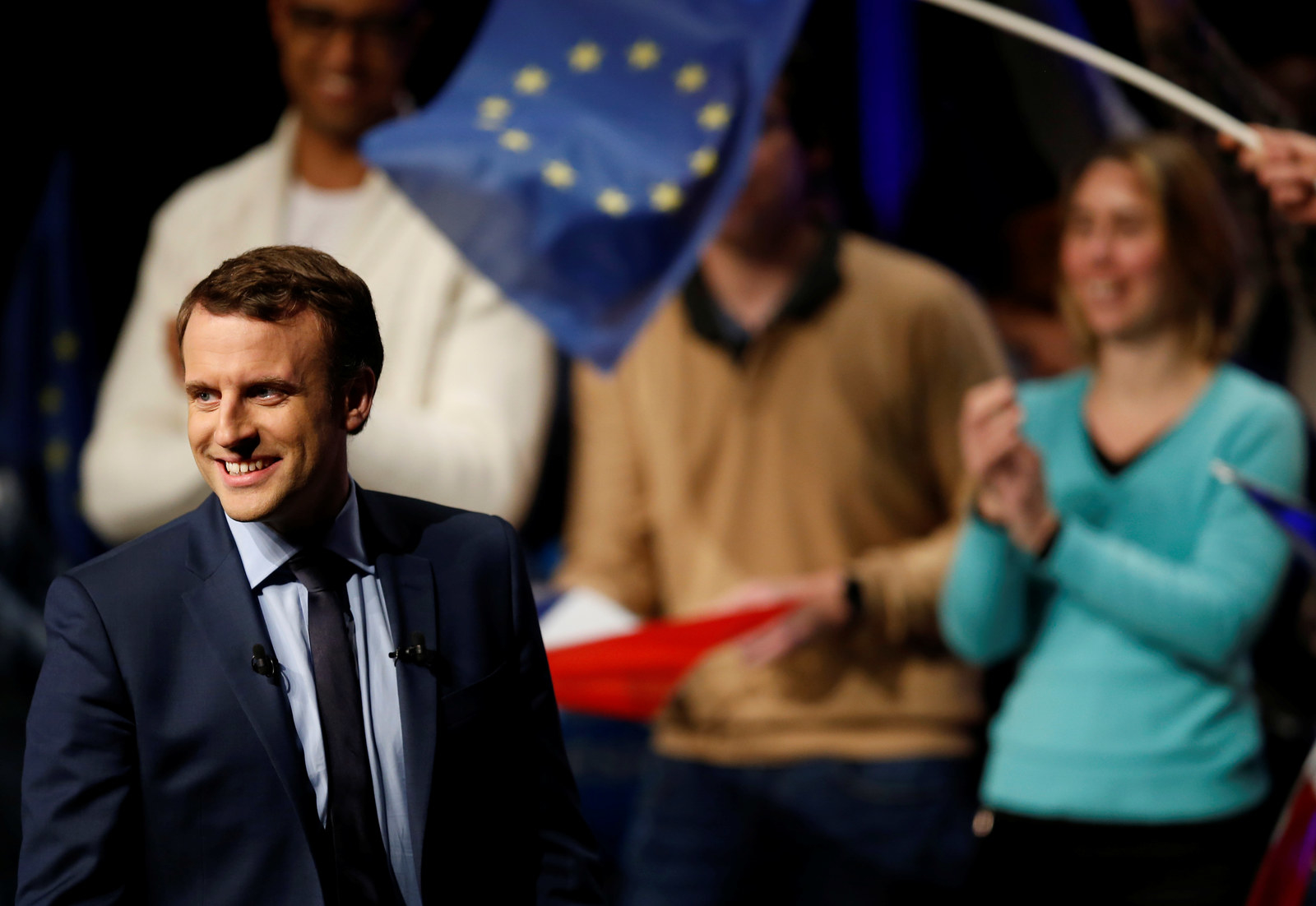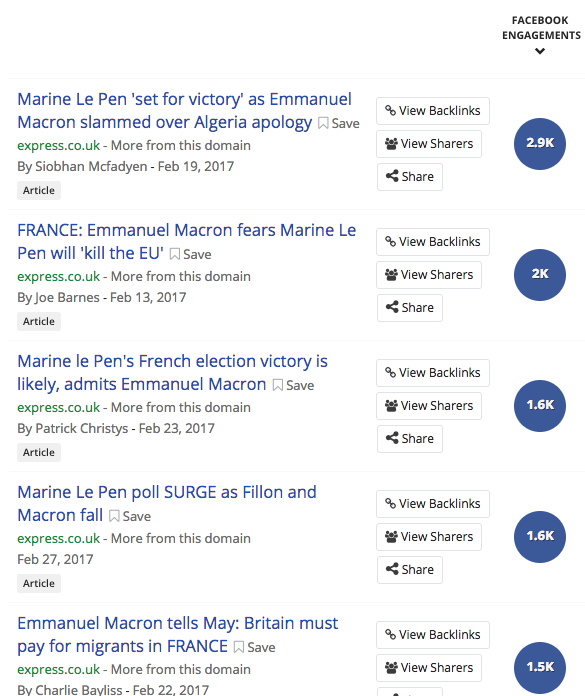
The UK press is providing disproportionate attention to France’s far-right presidential candidate Marine Le Pen, analysis by BuzzFeed News has found.
In the past three months, UK news publications listed with the aggregation service Nexis produced 602 headlines about Le Pen, four and a half times the number of stories they published about the French election’s frontrunner, Emmanuel Macron.
Sites such as the Express and The Independent have run startling, highly viral headlines suggesting Le Pen is surging in the polls or is on track for victory despite all current surveys suggesting she will almost certainly fail in a second-round vote.
Over the past three months, the hyperpartisan Express – whose owner Richard Desmond donated £1 million to the UK Independence Party in 2015 – published nearly two stories a day about Le Pen, far more than any other UK news outlet.
Recent headlines include “Marine Le Pen vows to REMOVE France from ‘MONSTER’ EU and start NEW bloc of rebel nations”, “Marine Le Pen SOARS in latest French election poll as rivals Macron & Fillon FALL AWAY”, and “'I will not submit!' Marine Le Pen REFUSES to grovel to Merkel and EU in swipe at elite”.
Many such pieces, which have generated thousands of engagements on Facebook, are misleading. They portray a country overcrowded by migrants and in chaos, where Le Pen appears to be surging towards an inevitable presidency with France on its way out of the European Union.

In reality, while polls do show Le Pen leading Macron in the first round of voting by a couple of percentage points, French elections take place over two rounds – there is a run-off vote between the top two candidates. According to these same polls, if an election were held today, Macron would defeat Le Pen resoundingly, by some 20 points.
"It is remarkable how large parts of the British press keep telling – or rather misinforming – the world about the pending collapse of the European Union while the UK itself is looking at the scenario of Scotland and possibly even Northern Ireland trying to leave the UK in order to stay in the EU," Wolfgang Blau, chief digital officer for Condé Nast International and the former editor of Zeit.de, told BuzzFeed News. "Whipping up a frenzy about the less likely scenario of the EU collapsing while downplaying the serious risk of Scottish secession is activism, not journalism."
After the Express, the most prolific outlets are The Independent (it produced 68 headlines about Le Pen in the past three months, with its former sister title the i producing a further 14 headlines), the Telegraph (47), and the Daily Mail and MailOnline (a combined total of 40). Both the Daily Mail and the Telegraph endorsed the Leave vote during last year’s EU referendum.
By comparison, other outlets, such as The Guardian and Sky News, published only about a dozen pieces each about Le Pen over the same period of time, according to the Nexis data.
The Nexis service includes most UK publications, with the exception of News Corp titles like The Sun. Search results on social media monitoring tool BuzzSumo list five pieces published by the tabloid about Le Pen compared to one about Macron, an article about UK prime minister Theresa May meeting Macron and slapping him down over any attempt to nick UK talent and poach British banks.
"UK media and especially our partisan press tends to report other countries' politics through a domestic prism," Charlie Beckett, media professor at the London School of Economics, told BuzzFeed News. "This has been accentuated by factors such as the reduction in foreign bureaux and foreign correspondents with real knowledge and a perspective from a place like France.
"This year's continental elections are seen as part of the Brexit debate. Eurosceptic newsrooms want to conflate all 'populist' right-wing parties as part of an uprising of anti-immigrant, anti-Brussels sentiment."
He added: "As we saw with Trump, charismatic, disruptive politicians do drive traffic for right- and left-wing readers but there's often a real lack of context or history."
For some outlets, one explanation for their content tilting so heavily towards the far-right candidate could be as straightforward as seeking traffic. Data from BuzzSumo shows that stories about Le Pen generate significantly more engagement than stories about Macron: The 20 top-performing stories in English about the far-right candidate all amassed more than 15,000 engagements on Facebook in the past three months, while only the top story about her rival reached that figure.
Some media observers believe today's race for attention is simply a natural evolution of how tabloids have always operated.
Nic Newman, a research associate at the Reuters Institute, told BuzzFeed News: "The UK tabloids have always traded in extreme and exaggerated news. In the past it was headlines designed to grab attention at the newsstand, but now online competition is pushing many publications further still. The brutal economics of the internet have intensified the battle for clicks while social media algorithms reward content that generates an emotional reaction (cheers or fears). In a political context this pushes towards the extremes. Nuance, complexity, or long-term solutions tend not to play well in today's frenzied news ecosystem.
"And you could argue that we are seeing some countervailing tendencies too. The the UK tabloids (especially the Express, Sun, Mirror, Star) are far less influential online than they were in their print heyday."

Traffic and novelty are likely to have helped Donald Trump receive substantially more free airtime than his rivals during last year's US election campaign. Every remark and tweet he made was translated into a headline, often verbatim, uncritically, and without context.
In the wake of Britain’s vote to leave the EU and the election of Trump, there is understandable interest in populist, anti-establishment, and far-right candidates and movements around the world, especially in EU states like France where their popularity is high and elections are upcoming. With seven weeks to election day and a scandal about fake jobs stalling the campaign of centre-right candidate François Fillon, polls can change: Le Pen could win the presidency.
Though tabloid insiders suggest there is no overarching strategy beyond writing up what is of interest to their UK audience, according to a number of industry experts some of the British press’s focus on Le Pen and her National Front (FN) party is not piqued by clicks and novelty alone.
Alongside the risk of a UK government no longer aligned with even the most fundamental geopolitical assumptions of continental Europe, Blau predicts partisanship becoming more acute as Brexit negotiations begin in earnest. "As the advertising model of most news organisations is now coming under pressure or has already collapsed for some," he said, "no news organisation can permanently ignore the economic interests or political passions of its respective constituency. There is no such thing as a completely nonpartisan news organisation."
He added: "Brexit is about identity politics as much – if not more – than it is about economics."
If anything, the unapologetically pro-EU and centrist Macron is a more novel feature in Europe’s recent political panorama than Le Pen. The FN was founded 44 years ago, while Macron’s En Marche movement is less than a year old. Since 2013, polls have consistently shown Le Pen around her current levels of support and making the second round of a presidential election. The FN was the largest party in the 2014 European parliament elections, and in 2015’s regional elections it ranked first in the first round of voting, but failed to win control of any region in the runoffs that followed.
Still, much of the UK coverage about Macron in right-wing outlets like the Mail, the Telegraph, and the Express in particular is negative in tone or references Macron mainly in the context of stories about Le Pen.

Academic research published by the Columbia Journalism Review last week concluded that content published by the alt-right news site Breitbart altered the broader news agenda in the US.
And there is evidence to suggest similar trends have also shaped the EU debate in Britain when it comes to how key issues and events are framed and perceived.
Farage says he has spent 10 years trying to make immigration synonymous with EU membership. Our evidence suggests i… https://t.co/owRlGs2jhT
Meanwhile, Macron himself has warned the media that applying stereotypes and labels to candidates instead of focusing on the substance of their proposals plays into the hands of the far right.
Must watch: how #Macron reverses charges and tell reporters they help the far-right by using cliches about him… https://t.co/otPsWHHLWe
The tone adopted by parts of the UK press isn't limited to coverage of French politics. Analysis published in January by BuzzFeed News about the top-performing news stories about Angela Merkel found that the most-shared pieces in English about the German chancellor were published by the Express, Breitbart, and the Mail, and were dominated by a string of highly critical, and often misleading, headlines.
The Express had yet to respond to a request for comment at the time of publication.
Methodology
To gather the data, BuzzFeed News used the monitoring tool Nexis by searching for headlines across UK publications containing "Le Pen" or "Macron" over the past three months. Duplicate headlines and unrelated stories (for example about the Macron stadium in Bolton) were excluded from the results. Headlines containing both "Macron" and "Le Pen" are included in both candidates' counts.
To measure the popularity of content, BuzzFeed News used the content analysis tool BuzzSumo, which enables users to search for content by keyword, URL, time range, language, and social share counts. BuzzFeed News searched in BuzzSumo for keywords such as “Le Pen” and “Macron”, filtering content in English, to find the top stories about these topics by Facebook engagement (defined as Facebook shares, comments, and reactions) and shares on Twitter and other social media sites over the past three months.
The data was gathered on 28 February 2017.
CORRECTION
The i is no longer the sister title of The Independent. A previous version of this piece had stated it was.
